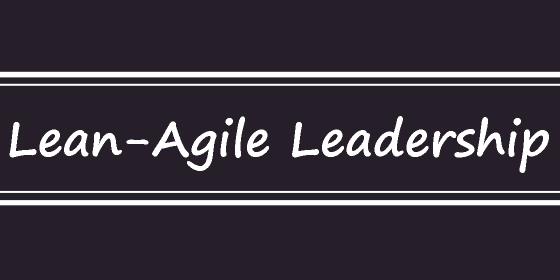Lean-Agile Leadership

Lean-Agile Leadership is a leadership approach that combines the principles of Lean thinking and Agile methodologies to foster a culture of continuous improvement, collaboration, and value delivery in organizations. It emphasizes empowering teams, promoting a growth mindset, and aligning leadership practices with the values and principles of Lean and Agile.
Key characteristics of Lean-Agile Leadership include:
- Servant Leadership: Lean-Agile leaders adopt a servant leadership mindset, focusing on supporting and enabling their teams rather than commanding and controlling them.
- Empowerment: Leaders empower teams to make decisions, take ownership, and self-organize. They trust their teams to achieve outcomes and foster an environment of autonomy and accountability.
- Collaboration: Lean-Agile leaders promote cross-functional collaboration, breaking down silos between departments and encouraging open communication and knowledge sharing.
- Lean Thinking: Leaders apply Lean principles, such as reducing waste, optimizing flow, and continuous improvement, to drive efficiency and effectiveness in the organization.
- Agile Values and Principles: Lean-Agile leaders embrace the Agile Manifesto and its underlying values and principles to guide decision-making and behaviors.
- Value-Based Leadership: Lean-Agile leaders prioritize delivering value to customers and stakeholders. They align the organization around a common purpose and focus on customer needs.
- Continuous Learning: Leaders encourage a culture of continuous learning and improvement, both at the individual and organizational levels.
- Adaptability: Lean-Agile leaders understand that change is inevitable and embrace adaptability. They respond quickly to changing market conditions and customer feedback.
- Lean Portfolio Management: Leaders use Lean-Agile principles to manage portfolios, ensuring that the organization invests in the right initiatives that align with strategic objectives.
- Lean Budgeting: Lean-Agile leaders adopt lean budgeting practices, promoting incremental funding and value-based investment decisions.
- Respect for People: Lean-Agile leadership values the contributions of individuals and fosters a culture of respect, diversity, and inclusion.
Lean-Agile Leadership is crucial for the successful implementation of Lean and Agile practices at scale within an organization. It involves a fundamental shift in leadership style from traditional command-and-control to one that empowers and enables teams to deliver value more effectively. Lean-Agile leaders act as catalysts for change, promoting a culture of learning, innovation, and adaptability throughout the organization.
Organizations with strong Lean-Agile leadership are better positioned to navigate complex and rapidly changing business environments, respond to customer needs, and deliver high-quality products and services with speed and efficiency.